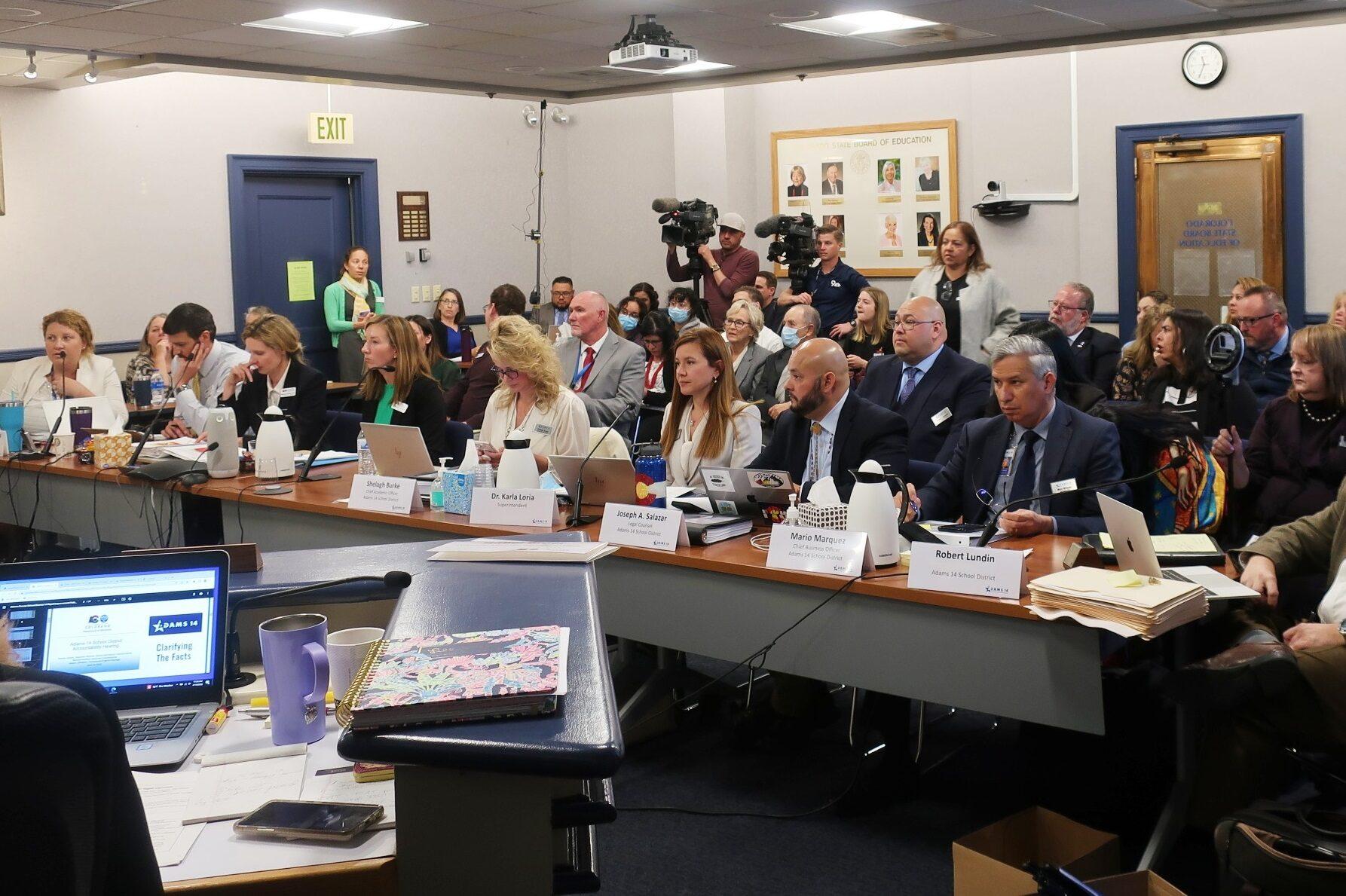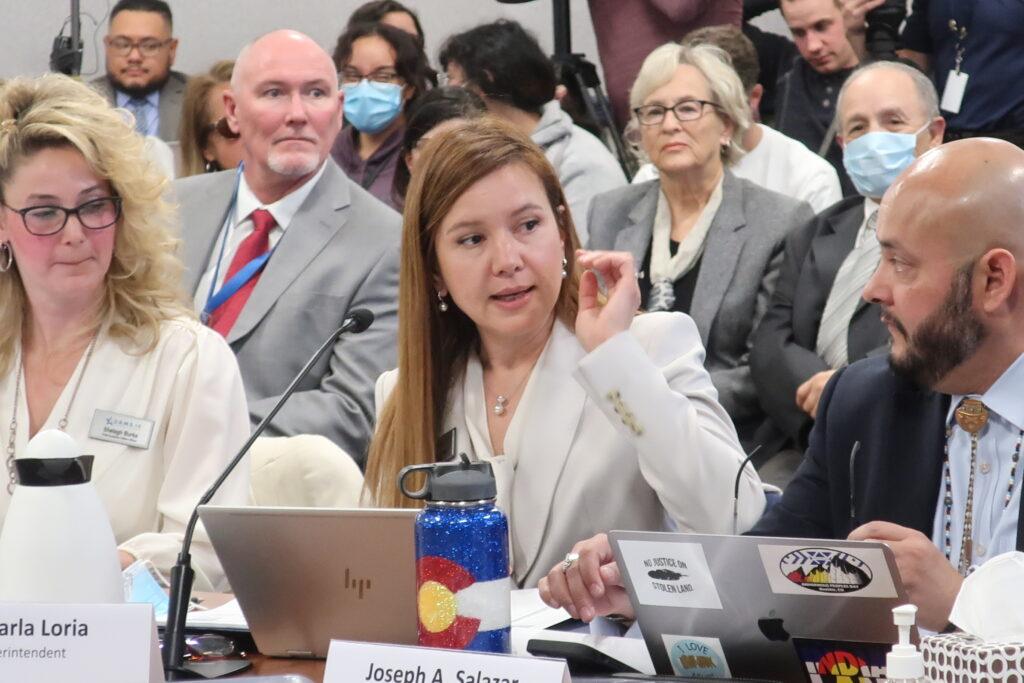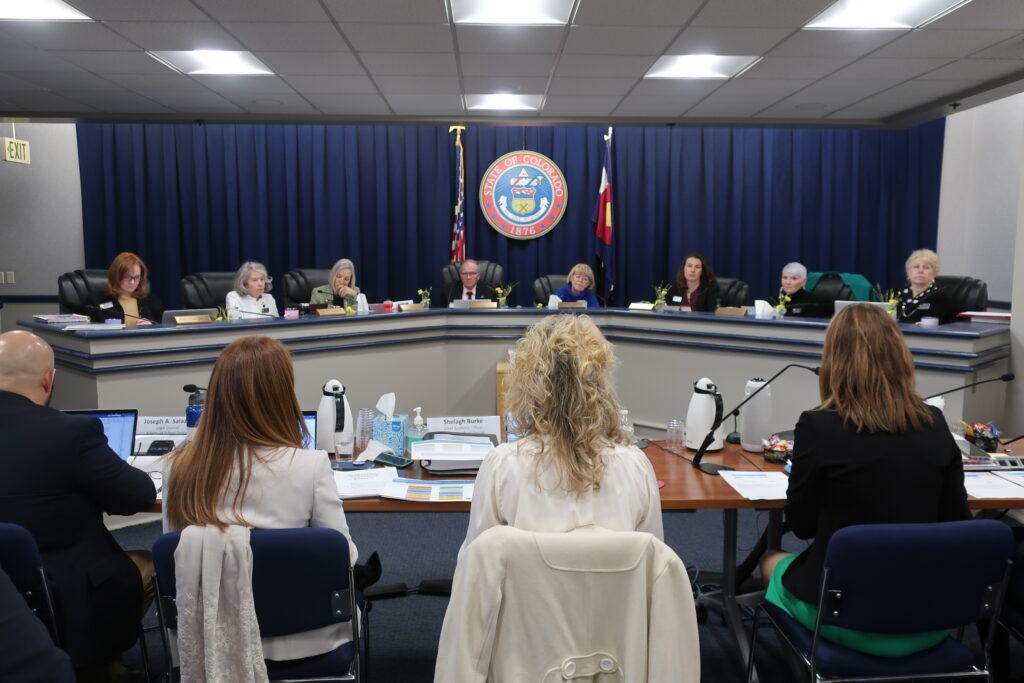
In a state that relies on a system of locally controlled school boards, Colorado’s State Board of Education ordered a school district to begin a process that could potentially see the district dissolved, annexed or consolidated. The board also voted to remove the district’s accreditation.
The board voted 4 to 3 Tuesday for the Adams 14 school district in Commerce City to begin working with surrounding districts on a reorganization plan — the first time the board has ordered such an action since the accountability law went into effect in 2009.
The vote was one of the most extreme options the state board could take. The board is required to direct action to schools and districts that remain on the state’s ‘accountability clock’ for five years in a row. Adams 14 is in its ninth year of low ratings.
Tuesday’s decision however, comes just a month after board members rejected a state panel’s recommendation to reorganize the district and close Adams City High School. It voted in April to allow the district to begin the process of seeking a partial external manager.
The district, which has an overwhelmingly low-income and Latino student body, has spent the past four weeks developing a turnaround plan with a nationally recognized organization, The New Teacher Project (TNTP), which was to be a “partial manager” or “functional air traffic controller” for the district. TNTP has worked with more than 200 school districts and several state departments of education nationwide.
The district conducted a number of community meetings over the past month to get the public’s blessing on the proposed partnership.
“What we heard and what our community overwhelmingly gave us the feedback on was in this group, we do not see a hidden agenda,” said the district’s spokesman Robert Lundin. “And we also don't see that it is designed to work ‘at’ somebody, but rather work with them. And that was incredibly refreshing.”
That wasn’t the sentiment about the last external manager, which the state ordered the district to get in 2018. MGT Consulting controlled the district from June 2019 to February 2022. District leaders didn’t regain control over the district until Feb. 4, after the contract with MGT was terminated because of contractual issues and concerns about the manager’s conduct.
The district requested that the state amend its 2018 order to allow it to work with a collaborative partial manager to provide an “expert lens” to lead the district’s growth.
In April, the state board gave the district another chance to manage itself – if it produced a high-quality plan and would work with a partial manager.
Proposed turnaround plan
The proposed partial manager plan was detailed in a three-year turnaround plan district leaders presented to the state board Tuesday. It outlined TNTP and the district’s roles and responsibilities.
TNTP would have focused broadly on improvement in four domains: leadership, talent development, instruction, and culture and climate shift. It was to be a strategic adviser to district leaders and principals, make recommendations, and also lead initiatives like directly coaching principals and helping recruit teachers. TNTP was to play a major role in boosting instructional practices, defining grade level expectations, and making sure teachers were using high-quality curriculum.
“Improving the outcomes and experience for our students and families is going to take a deliberate and focused approach in all of these areas,” Superintendent Karla Loria told the board.

The goal of the turnaround plan was to graduate bilingual students with two years of college credit or an associate’s degree, an apprenticeship certificate, or an alternative pathway “while demonstrating critical thinking, communication, collaboration, creativity, and cultural global competency skills in an ever-changing world.”
Three board members voted against reorganizing the district — they wanted to give the district a chance to work with TNTP.
“Knowing their work, I have confidence that this is a partner that can work with this district based on their students and the needs that I see,” said board member Lisa Escárcega.
Other board members said the district needs more radical change
It’s unclear why the majority of board members did a U-turn on their April vote, in which they appeared to show trust in the idea of a partial manager and the district’s new superintendent. Karla Loria has overseen turnaround efforts in more than two dozen Houston schools. But several board members seemed disappointed there weren't more details in the turnaround plan on what areas the outside partner would have authority over.
“There are certain authorities that a district cannot constitutionally surrender,” said board member Steve Durham. “There are many, many authorities, which they could, and I think in this instance should, properly surrender to an organization. And they certainly could have headed down that road, but elected once again, not to.”
District officials said they could provide more details once TNTP had a chance to do a deep analysis of the district.
“There will be delegated authorities to TNTP,” said the district’s legal counsel Joe Salazar. “This isn’t a consultant group. They will be here to help lead efforts.”
Superintendent Loria said TNTP, as a partial manager, would work closely with district leaders on every decision.
“What we are expecting is to have a true partnership. We do want to recognize the authority of the (local) board. But at the end of the day, we'll be collaborating, hand in hand, in every decision.”
She said her role as a superintendent is to ensure the district is making recommendations to the local board that are grounded in research.
“I will be remiss if I do not follow TNTP’s lead. We are selecting them because they are experts in this area. We are selecting them because they’re willing to come in and work alongside us. My commitment is to support their recommendations, to be quite frank.”
But that wasn’t enough for state school board members, some of whom questioned what would happen if the partial manager faced push back.
Board chair Angelika Schroeder also said she had hoped TNTP officials would be at the hearing to answer questions. Schroeder said the turnaround proposal felt like a “consultant relationship,” which the district had in 2017.
“I don’t feel like we’re moving forward,” she said. “I don’t know that TNTP is enough.”

District officials, meanwhile, said they were simply trying to respect the fact that the state board – and Adams 14’s own school board — hadn’t approved the partial manager plan with TNTP yet.
“By punishing us for not having them here is arbitrary and capricious," Salazar told the board after the vote. He said the district did exactly what it was supposed to as required by the board.
But board member Joyce Rankin said the district needs a complete overhaul.
“We've gotta get out of that comfort zone. We've gotta make some huge changes and change is not easy. It's difficult to make. I think we cannot afford to lose another generation of students in our schools.”
What happens next?
Tuesday’s vote activates a school organization planning committee involving Adams 14, and surrounding school districts, Mapleton, Adams Five Star and Brighton 27J to consider options including consolidation, detachment, annexation and the dissolution of the school district.
Board member Durham said a reorganization process could take at least 18 months. Public hearings must be held to gather community feedback on the plan, and voters in each of the affected districts would approve or turn down a plan during an election.
The board also voted 7 to 0 to allow Adams 14 to enter into a contract with TNTP as a partial manager in the interim. Working with an outside organization, board members said, would ensure students are being served until county voters decide the fate of the district. It’s unclear when such a vote would happen.
“It is of some comfort to know that community members will have their opportunity to voice their opinion about that first motion (reorganizing the district) with it on the ballot,” said board member Rebecca McClellan, who voted against the motion to reorganize the district.
Adams 14 leaders could not be reached for comment on the state board vote.









